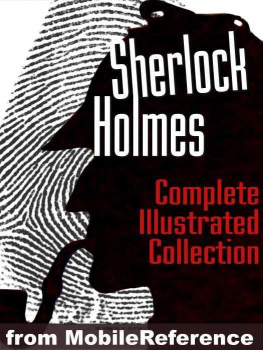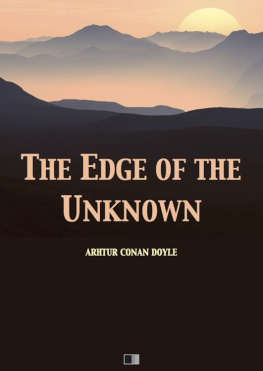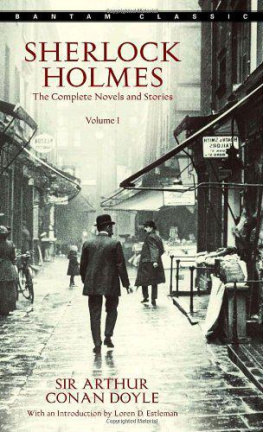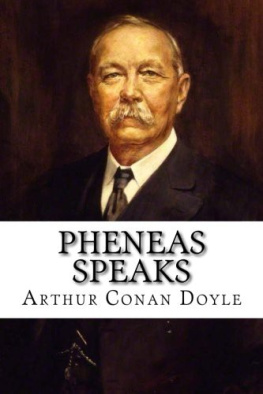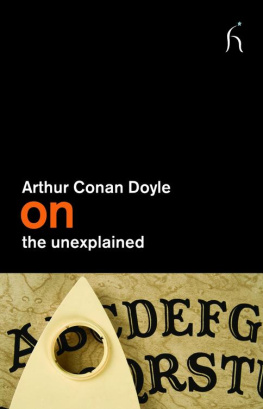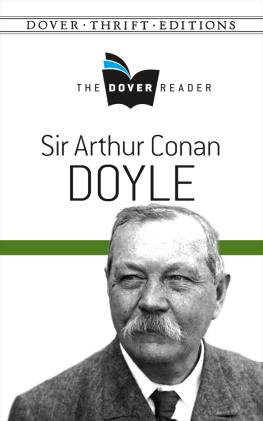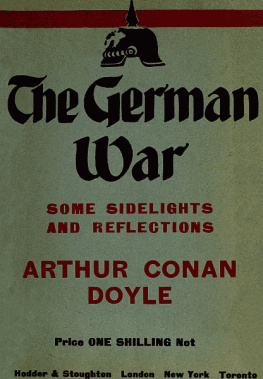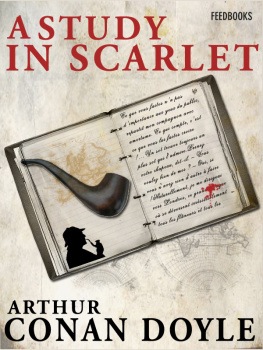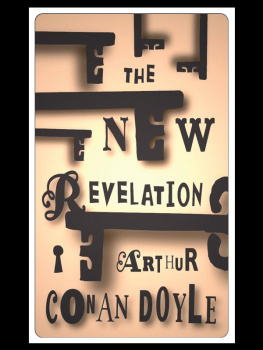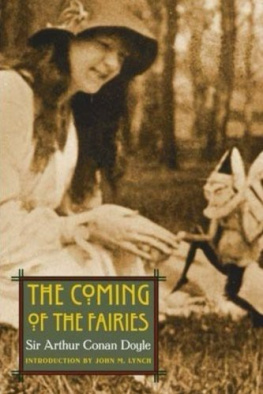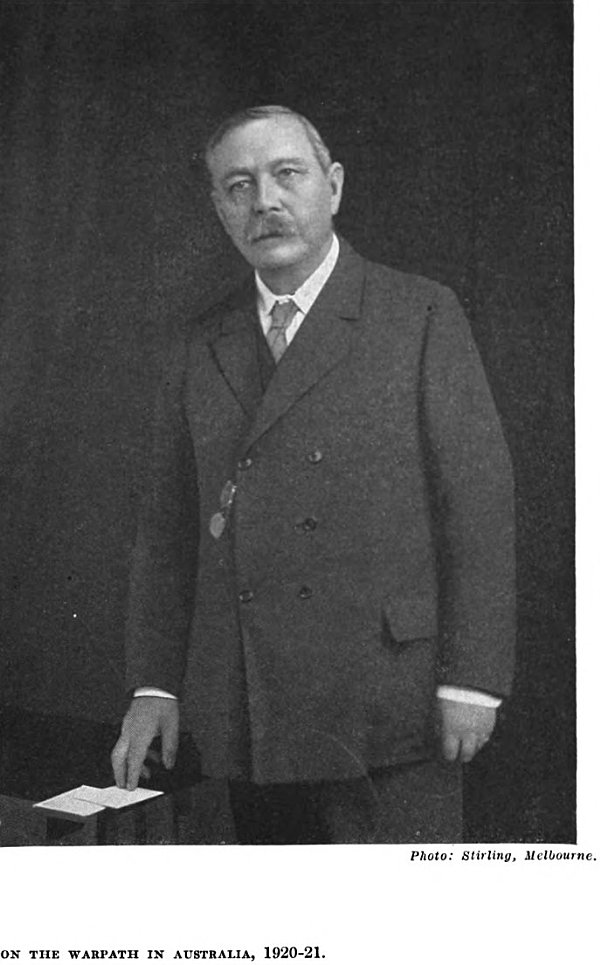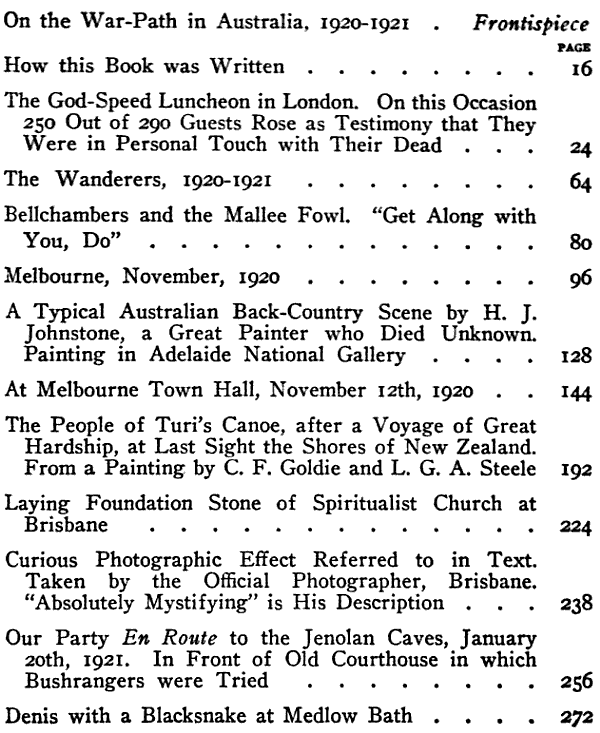This is a digital copy of a book that was preserved for generations on library shelves before it was carefully scanned by Google as part of a project to make the world's books discoverable online. See the back of the book for detailed information.
THE WANDERINGS OF A SPIRITUALIST
ARTHUR CONAN DOYLE
By SIR ARTHUR CONAN DOYLE
On the Life Hereafter
THE NEW REVELATION
THE VITAL MESSAGE
A History of the Great War
THE BRITISH CAMPAIGN IN
FRANCE AND FLANDERS 5 Vols.
Poems
THE GUARDS CAME THROUGH
Novels and Stories
DANGER! And Other Stories
THE DOINGS OF RAFFLES HAW
HIS LAST BOW
Some Later Reminiscences
of Sherlock Holmes
NEW YORK
GEORGE H. DORAN COMPANY
THE WANDERINGS OF A SPIRITUALIST
BY
ARTHUR CONAN DOYLE
Author of "The New Revelation," "The Vital Message," "A History of the Great War," etc.
ILLUSTRATED
NEW YORK
GEORGE H. DORAN COMPANY
COPYRIGHT, 1921,
BY GEORGE H. DORAN COMPANY
PRINTED IN THE UNITED STATES OF AMERICA
TO MY WIFE
THIS MEMORIAL OF A JOURNEY WHICH HER HELP AND PRESENCE CHANGED FROM A DUTY TO A PLEASURE
A. C. D.
July 18, 1921.
THE WANDERINGS OF A SPIRITUALIST
"Aggressive fighting for the right is the noblest sport the world affords."
Theodore Roosevelt.
THE WANDERINGS OF A SPIRITUALIST
CHAPTER I
The inception of the enterprise.The Merthyr Sance.Experience of British lectures.Call from Australia.The Holborn luncheon.Remarkable testimony to communication.Is individual proof necessary? Excursion to Exeter.Can spiritualists continue to be Christians?Their views on Atonement.The party on the "Naldera."
This is an account of the wanderings of a spiritualist, geographical and speculative. Should the reader have no interest in psychic thingsif indeed any human being can be so foolish as not to be interested in his own nature and fate,then this is the place to put the book down. It were better also to end the matter now if you have no patience with a go-as-you-please style of narrative, which founds itself upon the conviction that thought may be as interesting as action, and which is bound by its very nature to be intensely personal. I write a record of what absorbs my mind which may be very different from that which appeals to yours. But if you are content to come with me upon these terms then let us start with my apologies in advance for the pages which may bore you, and with my hopes that some may compensate you by pleasure or by profit. I write these lines with a pad upon my knee, heaving upon the long roll of the Indian Ocean, running large and grey under a grey streaked sky, with the rainswept hills of Ceylon, just one shade greyer, lining the Eastern skyline. So under many difficulties it will be carried on, which may explain if it does not excuse any slurring of a style, which is at its best but plain English.
There was one memorable night when I walked forth with my head throbbing and my whole frame quivering from the villa of Mr. Southey at Merthyr. Behind me the brazen glare of Dowlais iron-works lit up the sky, and in front twinkled the many lights of the Welsh town. For two hours my wife and I had sat within listening to the whispering voices of the dead, voices which are so full of earnest life, and of desperate endeavours to pierce the barrier of our dull senses. They had quivered and wavered around us, giving us pet names, sweet sacred things, the intimate talk of the olden time. Graceful lights, signs of spirit power had hovered over us in the darkness. It was a different and a wonderful world. Now with those voices still haunting our memories we had slipped out into the material worlda world of glaring iron-works and of twinkling cottage windows. As I looked down on it all I grasped my wife's hand in the darkness and I cried aloud, "My God, if they only knewif they could only know!" Perhaps in that cry, wrung from my very soul, lay the inception of my voyage to the other side of the world. The wish to serve was strong upon us both. God had given us wonderful signs, and they were surely not for ourselves alone.
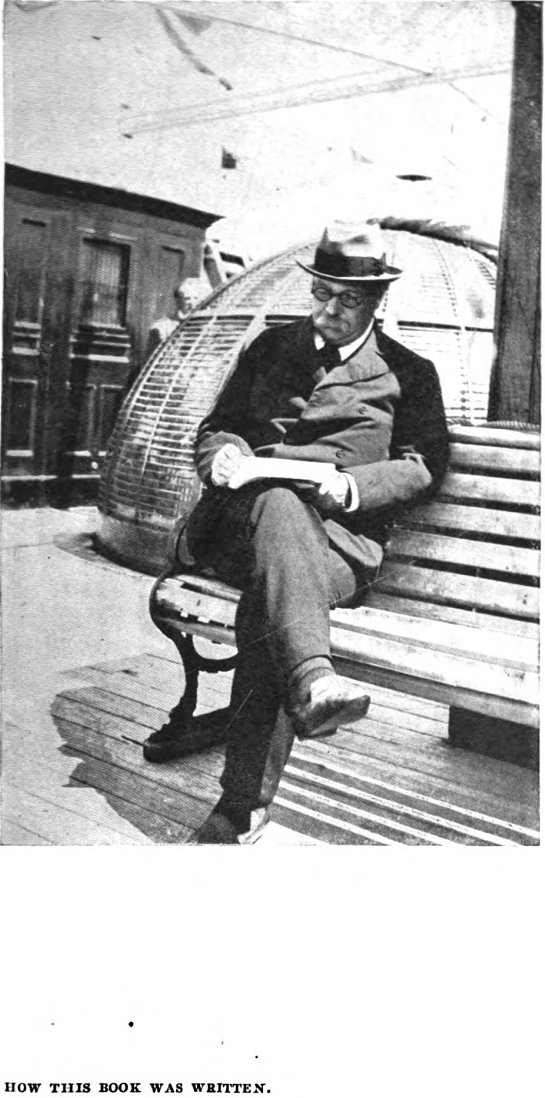
I had already done the little I might. From the moment that I had understood the overwhelming importance of this subject, and realised how utterly it must change and chasten the whole thought of the world when it is whole-heartedly accepted, I felt it good to work in the matter and understood that all other work which I had ever done, or could ever do, was as nothing compared to this. Therefore, from the time that I had finished the history of the Great War on which I was engaged, I was ready to turn all my remaining energies of voice or hand to the one great end. At first I had little of my own to narrate, and my task was simply to expound the spiritual philosophy as worked out by the thoughts and experiences of others, showing folk, so far as I was able, that the superficial and ignorant view taken of it in the ordinary newspapers did not touch the heart of the matter. My own experiences were limited and inconclusive, so that it was the evidence of others which I quoted. But as I went forward signs were given in profusion to me also, such signs as were far above all error or deception, so that I was able to speak with that more vibrant note which comes not from belief or faith, but from personal experience and knowledge. I had found that the wonderful literature of Spiritualism did not reach the people, and that the press was so full of would-be jocosities and shallow difficulties that the public were utterly misled. Only one way was left, which was to speak to the people face to face. This was the task upon which I set forth, and it had led me to nearly every considerable city of Great Britain from Aberdeen to Torquay. Everywhere I found interest, though it varied from the heavier spirit of the sleepy cathedral towns to the brisk reality of centres of life and work like Glasgow or Wolverhampton. Many a time my halls were packed, and there were as many outside as inside the building. I have no eloquence and make profession of none, but I am audible and I say no more than I mean and can prove, so that my audiences felt that it was indeed truth so far as I could see it, which I conveyed. Their earnestness and receptiveness were my great help and reward in my venture. Those who had no knowledge of what my views were assembled often outside my halls, waving banners and distributing tracts, but never once in the course of addressing 150,000 people, did I have disturbance in my hall. I tried, while never flinching from truth, to put my views in such a way as to hurt no one's feelings, and although I have had clergymen of many denominations as my chairmen, I have had thanks from them and no remonstrance. My enemies used to follow and address meetings, as they had every right to do, in the same towns. It is curious that the most persistent of these enemies were Jesuits on the one side and Evangelical sects of the Plymouth Brethren type upon the other. I suppose the literal interpretation of the Old Testament was the common bond.
Next page


